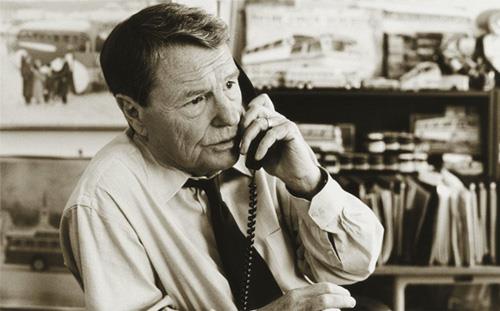
Jim Lehrer got to be the kind of journalist we all should want, and most of us say we want, and many of us really don't want.
Jim Lehrer died Thursday, age 85, after a career mostly defined by 36 years as host or cohost of the various incarnations of the MacNeil-Lehrer Report, which in 1983 became PBS's nightly news show.
Lehrer stepped down as host of what had become the PBS NewsHour in 2011, though he continued as a periodic contributor and, as recently as last month, guested on CNN to talk about the state of the media.
He was optimistic, which is not a unanimous view these days but is consistent with what he said in a 2011 interview as he was stepping down from the NewsHour.
"It's one thing to have access to unlimited news," he said, "and another to have it made available in a trustworthy, digestible form.
"Most people don't want to sit in front of a computer screen all day. So there will always be an audience for aggregation like the NewsHour. It just has to be done by someone they trust."
Lehrer began his career as a print journalist with the Dallas Morning News, crossed the street to the Dallas Times Herald, and then jumped over to public television at Dallas' KERA.
In 1973, he and his old colleague, Robert MacNeil, anchored nightly PBS coverage of the Watergate hearings, which was so popular that two years later, PBS teamed them up for the first version of what would soon become the MacNeil-Lehrer Report.
Choosing PBS isn't the way to get rich in broadcast journalism, and the prolific Lehrer supplemented his income by writing 20 novels, three memoirs, and numerous other side projects.
PBS had several irresistible lures, though, he said in 2011 – primarily that he got to practice old-style journalism, the kind of impartial reporting he had learned back in the newspaper game.
"You want all the information," he said. "What are all the facts? What does the left think? What does the right think? Robert MacNeil always said to always err on the side of giving people too much information, not too little."
Working for PBS, Lehrer said, also enabled him to focus on stories that had real importance, not just superficial glamour. He often noted that MacNeil-Lehrer covered O.J. Simpson's arrest and the verdict at the end of his trial, skipping the daily courtroom drama that dominated other print and television coverage.
While he pointedly did not criticize other media or audiences, he noted the unbalanced news diet wherein channels on the right and left often seem to function primarily as cheerleaders for their side.
As popular and perhaps comforting as they are, their viewers don't get the full context of important stories, Lehrer warned – "and without an informed public, you don't have a democracy."
A corollary problem, he added, is that as mainstream media shrinks and "does a lot of experimenting," young journalists have fewer and fewer places to learn the craft.
"You need a place to come up," he said. "It used to be you would start at a small newspaper and work your way up the chain. That's harder today. It's hard to find that first job. Some young people start with blogs."
It's just difficult to learn actual reporting, he added, "when you're sitting there with a laptop."
Actual reporting, he suggested, requires an insatiable appetite for information – all information, not just whatever reinforces a pre-formed viewpoint.
"It's a little like being a fireman," he said. "You hear the siren, and you wonder where the firetruck is going. If you don't care, get out of journalism."
Lehrer himself stayed in the game – full-time – until he was 77.
"It was a very quick 36 years," he said, reflecting on MacNeil-Lehrer and NewsHour. "You look up, it's Saturday, it's Monday, it's the '90s, it's Two Thousand and something."
He wasn't filling the time inconsequentially. He moderated 12 presidential debates. He interviewed the likes of President Clinton, Margaret Thatcher, and Yasser Arafat.
On the air, he was known for a calm, measured tone that he traced in part to covering the assassination of President John F. Kennedy in Dallas in 1963.
"One lone guy fired three shots and changed history," Lehrer said. "No day has gone by since when I haven't thought, 'That could happen today.' It's part of what I am, that sense of just how fragile everything is."
He finally decided to step back on his own terms, he said, and that was, in a sense, one final perk of having chosen the PBS route.
"I haven't had to follow anyone else's career or path," he said. "I've been able to do my work the way I thought it should be done.
"I still hear the fire engine."